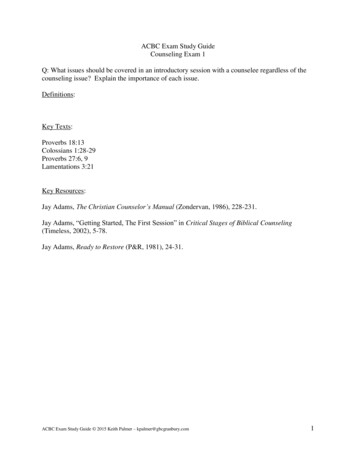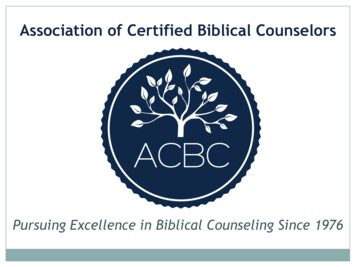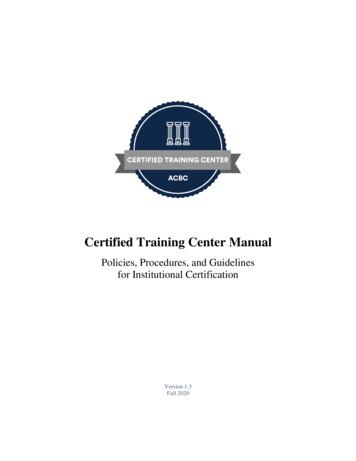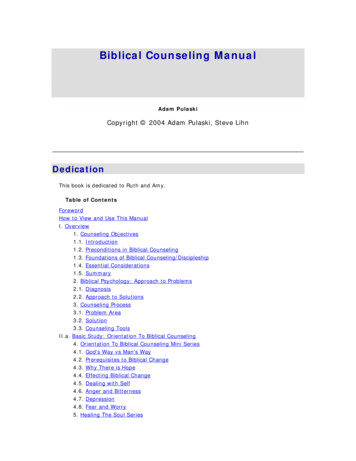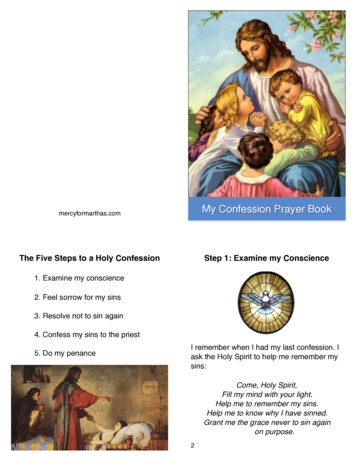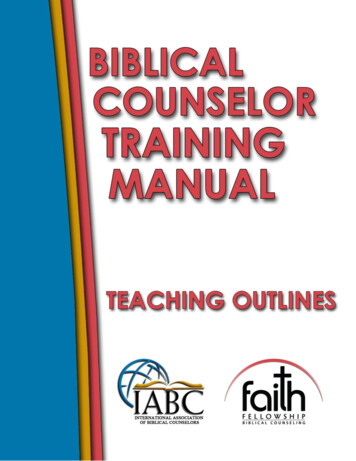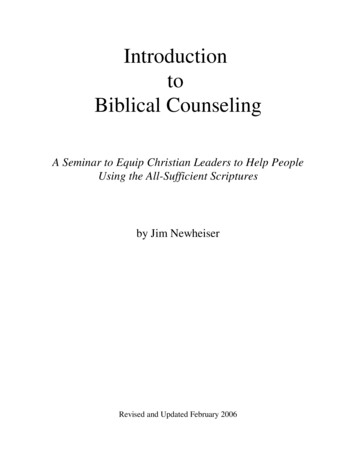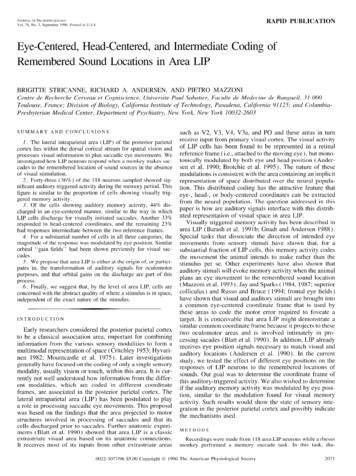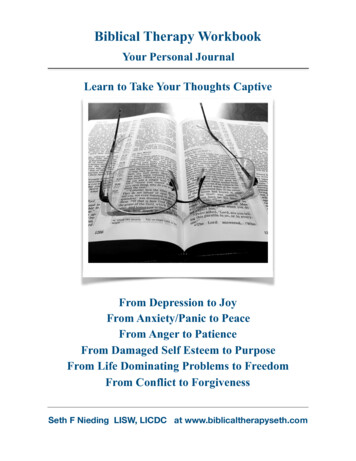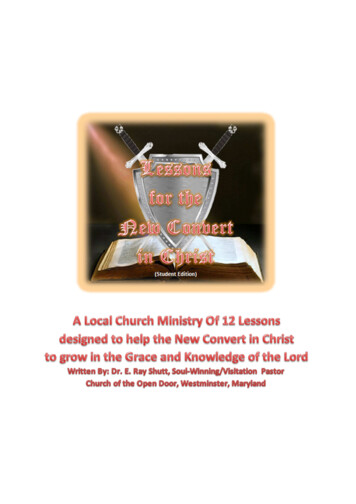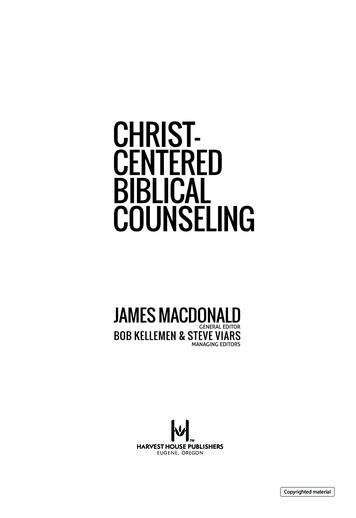
Transcription
Copyrighted materialChrist Centered Biblical Counseling book.indd 311/13/12 3:01 PM
All Scripture quotations, unless otherwise indicated, are taken from The Holy Bible, English StandardVersion, copyright 2001 by Crossway Bibles, a division of Good News Publishers. Used by permission.All rights reserved.Verses marked niv are taken from The Holy Bible, New International Version NIV . Copyright 1973, 1978, 1984, 2011 by Biblica, Inc. Used by permission. All rights reserved worldwide.Verses marked nasb are taken from the New American Standard Bible , 1960, 1962, 1963, 1968,1971, 1972, 1973, 1975, 1977, 1995 by The Lockman Foundation. Used by permission. (www.Lockman.org)Verses marked nkjv are taken from the New King James Version. Copyright 1982 by Thomas Nelson,Inc. Used by permission. All rights reserved.Verses marked nlt are taken from the Holy Bible, New Living Translation, copyright 1996, 2004.Used by permission of Tyndale House Publishers, Inc., Wheaton, IL 60189 USA. All rights reserved.Cover by Dugan Design Group, Bloomington, MinnesotaCover photo Viktor Gladkov / ShutterstockPublished in association with the literary agency of Wolgemuth & Associates, Inc.In nearly all cases, people’s names and details of their situations have been changed in order to protecttheir privacy. In the extremely few exceptions, permission has been granted to the publisher for the rightto use their names and stories.CHRIST-CENTERED BIBLICAL COUNSELINGCopyright 2013 by Biblical Counseling CoalitionPublished by Harvest House PublishersEugene, Oregon 97402www.harvesthousepublishers.comLibrary of Congress Cataloging-in-Publication DataChrist-centered Biblical counseling/James MacDonald, Bob Kellemen, and Stephen Viars, general editors.p. cm.Includes bibliographical references and index.ISBN 978-0-7369-5145-61. Counseling—Religious aspects—Christianity. 2. Bible—Psychology. I. MacDonald, James, II. Kellemen, Robert W. III. Viars, StephenBR115.C69C47 2013253.5—dc23 2012027772All rights reserved. No part of this publication may be reproduced, stored in a retrieval system, or transmitted in any form or by any means—electronic, mechanical, digital, photocopy, recording, or anyother—except for brief quotations in printed reviews, without the prior permission of the publisher.Printed in the United States of America13 14 15 16 17 18 19 20 21 / LB -KBD / 10 9 8 7 6 5 4 3 2 1Copyrighted materialChrist Centered Biblical Counseling book.indd 411/13/12 3:01 PM
ContentsForeword—David Powlison . . . . . . . . . . . . . . . . . . . . . . . . . . . . . . . . . .7Introduction: In Christ Alone—Bob Kellemen and Steve Viars . . . . . . .11Part 1: A Practical Theology of Biblical Counseling1. The Glory of God: The Goal of Biblical Counseling—John Piper and Jack Delk . . . . . . . . . . . . . . . . . . . . . . . . . . . . . . . . . . . .232. The Power of the Redeemer—Ernie Baker and Jonathan Holmes . . . . .373. The Ministry of the Holy Spirit—Justin Holcomb andMike Wilkerson . . . . . . . . . . . . . . . . . . . . . . . . . . . . . . . . . . . . . . . . . . .494. The Unity of the Trinity—Kevin Carson and Jeff Forrey . . . . . . . . . . . .635. The Grand Narrative of the Bible—John Henderson . . . . . . . . . . . . . . .756. The Sufficiency of Scripture—Steve Viars and Rob Green . . . . . . . . . . .897. The Spiritual Anatomy of the Soul—Bob Kellemen andSam Williams . . . . . . . . . . . . . . . . . . . . . . . . . . . . . . . . . . . . . . . . . . . . . 1078. The Influences on the Human Heart—Jeff Forrey and Jim Newheiser . . 1239. The Problem of Sin—Robert Jones and Brad Hambrick . . . . . . . . . . . . 13910. The Centrality of the Gospel—Robert Cheong . . . . . . . . . . . . . . . . . . . 15311. The Gospel in Balance—Stuart Scott . . . . . . . . . . . . . . . . . . . . . . . . . . . 16712. The Pursuit of Holiness—Lee Lewis and Michael Snetzer . . . . . . . . . . . 18113. The Weapons of Our Warfare—Bob Kellemen andDwayne Bond . . . . . . . . . . . . . . . . . . . . . . . . . . . . . . . . . . . . . . . . . . . . . 19514. The Hope of Eternity—Nicolas Ellen and Jeremy Lelek . . . . . . . . . . . . . 209Part 2: A Practical Methodology of Biblical Counseling15. The Biblical Counseling Ministry of the Local Church—Rob Green and Steve Viars . . . . . . . . . . . . . . . . . . . . . . . . . . . . . . . . . . . 22516. The Health of the Church and Biblical Counseling—Deepak Reju and Mark Dever . . . . . . . . . . . . . . . . . . . . . . . . . . . . . . . . . 23917. The Personal, Private, and Public Ministry of the Word—Kevin Carson . . . . . . . . . . . . . . . . . . . . . . . . . . . . . . . . . . . . . . . . . . . . . 257Copyrighted materialChrist Centered Biblical Counseling book.indd 510/29/12 3:25 PM
18. The Transformational Tie Between Small Group Ministryand Biblical Counseling—Brad Bigney and Ken Long . . . . . . . . . . . . . . 27119. The Goal and Focus of Spiritual Formation—Robert Cheong and Heath Lambert . . . . . . . . . . . . . . . . . . . . . . . . . . . . 28520. The Importance of Multiculturalism in Biblical Counseling—Rod Mays and Charles Ware . . . . . . . . . . . . . . . . . . . . . . . . . . . . . . . . . . 29721. The Nature of the Biblical Counseling Relationship—Jeremy Pierre and Mark Shaw . . . . . . . . . . . . . . . . . . . . . . . . . . . . . . . . . 30922. The Central Elements of the Biblical Counseling Process—Randy Patten and Mark Dutton . . . . . . . . . . . . . . . . . . . . . . . . . . . . . . . 32523. The Diagnoses and Treatment of Idols of the Heart—Howard Eyrich and Elyse Fitzpatrick . . . . . . . . . . . . . . . . . . . . . . . . . . . 33924. The Power of Confession and Repentance—James MacDonald and Garrett Higbee . . . . . . . . . . . . . . . . . . . . . . . . . . 35125. The Power of Forgiveness—James MacDonald and Garrett Higbee . . . . 36526. The Ministry of Soul Care for People Who Suffer—Bob Kellemen and Greg Cook . . . . . . . . . . . . . . . . . . . . . . . . . . . . . . . . 37727. The Biblical Understanding and Treatment of Emotions—Jeff Forrey . . . . . . . . . . . . . . . . . . . . . . . . . . . . . . . . . . . . . . . . . . . . . . . . 39328. The Complex Mind/Body Connection—Laura Hendrickson . . . . . . . . 409Conclusion: Unity in Truth and Love—Bob Kellemen and Steve Viars . . . . . . . . . . . . . . . . . . . . . . . . . . . . . . . . . 423Appendix A: The Mission, Vision, and Passion Statementof the Biblical Counseling Coalition . . . . . . . . . . . . . . . . . . . . . . . . . . . . 427Appendix B: The Confessional Statement of theBiblical Counseling Coalition . . . . . . . . . . . . . . . . . . . . . . . . . . . . . . . . . 429Appendix C: The Doctrinal Statement of the BiblicalCounseling Coalition . . . . . . . . . . . . . . . . . . . . . . . . . . . . . . . . . . . . . . . 439Bibliography of Sources Cited . . . . . . . . . . . . . . . . . . . . . . . . . . . . . . . . . 447Topical Index . . . . . . . . . . . . . . . . . . . . . . . . . . . . . . . . . . . . . . . . . . . . . . 457Scripture Index . . . . . . . . . . . . . . . . . . . . . . . . . . . . . . . . . . . . . . . . . . . . 461Author Index . . . . . . . . . . . . . . . . . . . . . . . . . . . . . . . . . . . . . . . . . . . . . . 465Endnotes . . . . . . . . . . . . . . . . . . . . . . . . . . . . . . . . . . . . . . . . . . . . . . . . . 467Copyrighted materialChrist Centered Biblical Counseling book.indd 610/29/12 3:25 PM
ForewordDavid PowlisonWhat kind of book are you picking up? Christ-Centered Biblical Counsel-ing is like an architect’s 1:12 scale model. A scale model intends to communicate “the concept” of a structure, not the myriad details of engineering,construction process, financing, and the like. Think of this book as a scalemodel of biblical counseling, delineating key theological underpinningsand sketching key methodological implications. There’s enough detail togive you a feel for what the finished house will look like. But making thehouse your home will take work and prayer, further study and conversation, much putting into practice, and a lifetime of our maturing together.Christ-Centered Biblical Counseling paints the broad strokes of counseling.Just for starters, those broad strokes revolutionize the meanings that our culture attaches to the word counseling. These chapters do not intend to cover allcounseling problems or topics—or to probe particular problems or topics ingreat detail. However, the discussion and case studies will give you a solid feelfor how the Word of life speaks into the lives of troubled and troublesomepeople who face a world of troubles.This book affirms that a good counselor is many things simultaneously:tender and firm, responsive yet purposeful, candid and tactful, patient yeturgent, attentive and instructive, profound yet practical, prayerful and hardworking, comforting yet challenging, empathetic and objective, flexible yetcommitted, faithful to Jesus Christ and relevant to any person facing anytrouble along with many other good and desirable qualities. While the ingredients of deft conversation are hard to capture on paper, the tone and contentof what you read will give you a feel for how godly wisdom carries on a compassionate and constructive conversation.This book will not unpack the differing ways that, say, Deuteronomyor Ruth, a psalm or proverb, a scene in Luke, or a sentence from Ephesians7Copyrighted materialChrist Centered Biblical Counseling book.indd 710/29/12 3:25 PM
8Christ-Centered Biblical Counselingcome to life in the grit and grime of life lived. But you will gain a feel for thecomprehensive relevance and adaptability of God’s diverse self-revelation. TheWord made flesh turns worlds upside down. The Christ who calls all nations,tribes, tongues, and peoples also speaks to each individual at the very pointsof deepest need.As part of your reading strategy, approach this book as a scale modelintending to communicate the concept of biblical counseling. All of us whocounsel or desire to do so will better serve the welfare and well-being of othersas we catch this vision, so that we can then work out the myriad details andimplications.It is no accident that this is the work of many contributors—a network, acoalition, a community of shared vision and mission. We are united in the conviction that the Christian faith speaks foundationally to the issues of counseling.We are not clones, of course. We live and work within different ecclesiastical cultures and denominations. We serve in different organizations, pursuing different ministry objectives. We have different gifts, different strengthsand weaknesses. But an underlying unity predominates. You will notice howconsistently the common ground of Christian faith controls the discourse.Take careful notice of the common commitments that bring diverse Christians to work together.As you read, you will note these pages represent a development upon thehard work of a previous generation. You will hear in the core commitmentsan essential continuity with the past. For example, Reality is God-centered and all human beings are worshippers,whether or not they are conscious of this reality and its implications. God our Father, Christ our Savior, and the Holy Spirit our Lifegiver is purposefully on-scene and actively working in people’slives. Scripture is comprehensively relevant to the things that concern,preoccupy, and trouble humankind. Counseling is an integral aspect of ministry and of church life.Copyrighted materialChrist Centered Biblical Counseling book.indd 810/29/12 3:25 PM
Foreword9Christ-Centered Biblical Counseling upholds these commitments and more.So come to listen. Learn. Ponder. Expect familiar Bible words, truths, metaphors,and passages to come at life and counseling from a fresh angle, and to generate fresh implications.Then ask questions that carry your learning forward: How might I understand and handle this life problem or this theological reality with greater faithfulness and wisdom? How can I better conceptualize and practice this aspectof counseling? How can I grow truer to the mind-set and express purposes ofChrist?Ultimately the purpose of a scale model is to build the real thing. So read asif you are also part of the construction crew. As one who desires to counsel biblically, help to build a proper structure for faithful counseling ministry withinthe living body of Christ. Give yourself to the work of reading well, so that yourresponse to this book contributes to this work-in-progress that God calls “mypeople.” We grow up into the image of Jesus Christ by speaking truth in love,and that is the heart of a counseling model and methodology worth building.David Powlison received his AB from Harvard College and workedfour years in psychiatric hospitals before attending seminary. Hegraduated with an MDiv from Westminster Theological Seminaryand began a career in biblical counseling. Along the way he receivedhis PhD from the University of Pennsylvania in the history of science and medicine, with a focus in the history of psychiatry. Davidhas been at the forefront of thinking and writing in biblical counseling for more than 30 years. He has written numerous articles oncounseling and on the relationship between faith and psychology.His books include Speaking Truth in Love, Seeing with New Eyes,and The Biblical Counseling Movement: History and Context. Davidis the senior editor for the Journal of Biblical Counseling. He teachesas a faculty member for the Christian Counseling and EducationalFoundation (CCEF) in Glenside, Pennsylvania, and also serves as avisiting professor at Westminster Theological Seminary.Copyrighted materialChrist Centered Biblical Counseling book.indd 910/29/12 3:25 PM
Copyrighted materialChrist Centered Biblical Counseling book.indd 2010/29/12 3:25 PM
Part 1A Practical Theology ofBiblical CounselingCopyrighted materialChrist Centered Biblical Counseling book.indd 2110/29/12 3:25 PM
Copyrighted materialChrist Centered Biblical Counseling book.indd 2210/29/12 3:25 PM
1The Glory of God:The Goal ofBiblical CounselingJohn Piper and Jack DelkJohn PiperWhile preaching a sermon series at our church on the subject of escha-tology, I taught from 1 Thessalonians 4:13-18 about Jesus’ second coming.Paul begins and ends the passage in a way that allowed me to say to mypeople, “This is what you do with eschatology.” Paul begins like this: “Wedo not want you to be uninformed, brothers, about those who are asleep,that you may not grieve as others do who have no hope.” Then he closes,“Therefore encourage one another with these words.” He begins and endson a pastoral note. Eschatology is about how you suffer and how you help.I stopped speaking, and we took some time for discussion. People onlywanted to know whether the time frame was premillennial, postmillennial, oramillennial. I responded, “You’re missing the point. Do you hear this? Pauldoesn’t want them to be ignorant of the fact that Jesus is alive. Jesus will comeback. We will be with Him forever. Why? So they’ll grieve a certain way. Sothey’ll encourage (comfort) each other a certain way. Do you see what knowledgeis about? It’s about how to grieve. It’s about how to counsel grieving friends.You speak knowledge into people’s lives, and it impacts their grief. This is whatyour mouth is for: ‘The mouth of the wise is a fountain of life.’ Knowledge isso others can drink life-giving words. Doctrine is all about delight, all abouthow you live, all about how you counsel.”23Copyrighted materialChrist Centered Biblical Counseling book.indd 2310/29/12 3:25 PM
24Christ-Centered Biblical CounselingDefining Biblical CounselingAs a starting foundation, consider my definition of biblical counseling:Biblical counseling is God-centered, Bible-saturated, emotionally-in-touch useof language to help people become God-besotted, Christ-exalting, joyfullyself-forgetting lovers of people. I’d like to unpack that definition in what follows, and ask, What is the relationship between delight and doctrine? What isthe relationship between counseling and the church? What is the relationshipbetween God’s glory and His love for us?Teaching TruthBiblical counseling is God-centered, Bible-saturated, emotionally-in-touchuse of language to help people become God-besotted, Christ-exalting, joyfullyself-forgetting lovers of people. What does that mean? First, it means teachingtruth. That 1Thessalonians 4:14-18 passage bursts with truth:Since we believe that Jesus died and rose again, even so, throughJesus, God will bring with him those who have fallen asleep. For thiswe declare to you by a word from the Lord, that we who are alive,who are left until the coming of the Lord, will not precede those whohave fallen asleep. For the Lord himself will descend from heavenwith a cry of command, with the voice of an archangel, and withthe sound of the trumpet of God. And the dead in Christ will risefirst. Then we who are alive, who are left, will be caught up togetherwith them in the clouds to meet the Lord in the air, and so we willalways be with the Lord. Therefore encourage one another with thesewords.Biblical counseling is nothing if it is not God-centered and Biblesaturated. R.C. Sproul said to me not long after James Boice died that inone of his last conversations with him, Dr. Boice said, “R.C., we are surrounded by pastoral wimps who say, ‘People don’t need teaching, they don’tneed knowledge: they need to be hugged, they need silence, they need stories, they need experiences shared.’” James Boice is absolutely right about theshrinking emphasis on teaching. People desperately need to be taught aboutthe nature of God. They desperately need a biblical, God-centered perspectiveCopyrighted materialChrist Centered Biblical Counseling book.indd 2410/29/12 3:25 PM
The Glory of God: The Goal of Biblical Counseling25on everything. Before a calamity like September 11, we lay the foundations forour people of the granite sovereignty and glory of God so that they don’t say,“Nonsense!” or don’t shut their mouths with nothing to say. That’s what biblical counseling is about—whether it is from the pulpit, in the office, or overthe fence in the backyard. My take on the nature of counseling is that it has todo with knowledge, it has to do with our mouth, it has to do with doctrine, ithas to do with the nature of God—communicated in ways that change hearers.I get that from 1 Thessalonians 4:13-18, and, of course, it is all over theBible. Consider Romans 15:4: “Whatever was written in former days waswritten for our instruction, that through endurance and through the encouragement of the Scriptures we might have hope” (emphasis added). Everythingwritten is hope-giving. It all moves from written knowledge to heart-fearing.Or Psalm 19:7-8, “The law of the Lord is perfect, reviving the soul; the testimony of the Lord is sure, making wise the simple; the precepts of the Lord areright, rejoicing the heart.” Teaching makes alive. Witness makes wise. Preceptsproduce joy. If they don’t, something is wrong. You are doing something wrong!Precepts produce change in emotions. Preaching goes to the emotionswith doctrine. John 15:11 says, “These things I have spoken to you that yourjoy might be full.” Speaking is about joy. Preaching is about joy. Counselingis about joy. You go from the head to the mouth to the head to the heart andproduce joy, which transforms a person’s life.Restoring Counseling to the ChurchLet me shift to my second concern—getting counseling into the church.Where else would it be, for goodness’ sake? Can it be anywhere else and be true?There are hindrances here. Let me point out and address just one. A lot ofpeople reading this might respond, “It doesn’t work,” or “I’ve never seen anybody given to doctrine who is emotionally in touch!” There’s one of the biggest obstacles. Here’s my recommendation. Almost everything I do with mylife is intended to solve this problem. If counseling, as I have laid it out, is tobe restored to the church, affection must be restored to reflection. If counselingis to be restored to the church, delight in God must be restored to doctrines aboutGod. Savoring Christ must be restored to seeing Christ. Tender contrition mustbe restored to tough conviction. Communion with God must be restored tocontending for God.Copyrighted materialChrist Centered Biblical Counseling book.indd 2510/29/12 3:25 PM
26Christ-Centered Biblical CounselingI take that last one from John Owen. He said, “We have communion withGod in the doctrines we contend for.”1 That is his measure of whether he is contending truly. “I must learn to commune with God in the doctrine.” Isn’t thatan interesting phrase? Who talks like that today? You have to go back 300 yearsto find things so powerful on sin and communion with God. “Contending forand communing with God in a doctrine.” Where is there a systematic theologyclass that helps students realize that when you unpack the incarnation or thenature of the Trinity or the two natures of Christ or the substitutionary atonement, you commune with the Lord as you defend and contend for the doctrine, or else you are not doing it right? No wonder people often don’t wantto be around doctrinally driven individuals! They aren’t doing doctrine right.They aren’t emotionally in touch with the truths they teach.I believe we have a huge problem with this in the Reformed community.Reformed people are so afraid of emotion that they think I am talking aboutsubjectivism. Pastors have a big job here, an impossible job. But we who arepastors have to do this. We have to consider our biblical mandate with regardto modeling for our people what is hindering the arrival of their being effectivecounselors to each other. I am more concerned about my people counselingeach other than I am about my doing counseling myself. I counsel mainly fromthe pulpit in order to create counselors, a couple thousand of them.Here is what it says about pastors and God’s people in Hebrews 13:17:“Obey your leaders and submit to them, for they are keeping watch over yoursouls, as those who will have to give an account. Let them [the leaders, elders,pastors] do this with joy and not with groaning, for that would be of no advantage to you.” This is an amazing mandate for pastors. Basically, it is saying thatif pastors want to love their people and to be an advantage rather than a hindrance to them, they need to be happy. Is that a bad paraphrase? I’d go to themat with any scholar over that paraphrase! It says, “Let them do this pastoralwork—watching over your souls—with joy, not with groaning, because thatwould be of no advantage to you.”Pastors, Christian leaders, and biblical counselors, if you want to love andbless people, pursue your joy! If you become indifferent to the pursuit of yourown joy, you become indifferent to love, and you can’t equip the church tocounsel. That is sin! You cannot love people if you are indifferent to your happiness in the Lord.Copyrighted materialChrist Centered Biblical Counseling book.indd 2610/29/12 3:25 PM
The Glory of God: The Goal of Biblical Counseling27Now there are hosts of Reformed and other types who sin when they preachand talk about doctrine by denying in their whole demeanor the preciousnessof what they are talking about. The people do not come away saying, “That wasthe sweetest thing I have ever heard.” The pastor or biblical counselor doesn’tlook like he thinks it is sweet or precious. He doesn’t look like he thinks it islife-changing or that it would make him happy. In fact, he seems to be talkingin a way that indicates he’s kind of afraid that it will make him happy.Why would anyone want to come back to listen? We all want to be happy!That is exactly the way God made us. The desire to be happy is the same as thedesire of being hungry. It is a God-given thing, written right on our hearts.God put Himself as the all-satisfying center of all joy. The reason you are nothappy, if you are not, is because you have not gotten to the center yet. Joyfulleaders, who commune with the truths they contend for, are crucial to restoringcounseling to the church.The Glory of GodThird, how does this relate to the glory of God? This restoring delightto doctrine, affection to reflection, savoring to seeing, communion to contending—how does that relate to the glory of God? The whole book of Hebrewsmoves toward big issues like hold fast to your confidence, be strong in yourencouragement, be joyful in your assurance, be deep in your contentment(Hebrews 3:6; 6:18; 10:34; 13:5). These words—confidence, encouragement,assurance, contentment—are all emotion-laden. The book of Hebrews is allabout your joy, persevering in it, and being radically ready to lay down yourlife to take the gospel where it hasn’t gone.Why? Because it is all about Christ. Everything in it is about the superiorityof Christ’s priesthood, sacrifice, covenant, and mediatorial work. That glorious,grand, Christ-exalting foundation in Hebrews aims to produce confidence andjoy and assurance and contentment and the radical lifestyle that flows from it.That means that if you preach, teach, and counsel in a way that people beginto delight in this Christ, He gets all the glory. The book is structured so thatthe magnificence of Christ’s superiority supports confidence, encouragement,and contentment. The pervasive presence of such positive, satisfying emotionsin your church magnifies the foundation for them, Jesus Christ.Copyrighted materialChrist Centered Biblical Counseling book.indd 2710/29/12 3:25 PM
28Christ-Centered Biblical CounselingJonathan Edwards said it this way:So, God glorifies Himself also toward the creatures in two ways: 1. Byappearing to their understanding. 2. In communicating Himself totheir hearts, and in their rejoicing and delighting in, and enjoying,the manifestations which He makes of Himself God is glorified, notonly by His glory’s being seen [known, reflected upon], but by its beingrejoiced in God made the world that He might communicate, andthe creature receive, His glory and that it might [be] received bothby the mind and the heart. He that testifies his idea of God’s glory[doesn’t] glorify God so much as he that testifies also his approbationof it and his delight in it.2You see and understand Christ: doctrine. You trust and love Christ: joy.On the one hand, you have some Reformed leaders who testify to theirideas about God by crossing every “t,” dotting every “i,” and getting the doctrines right, to which I say, “Absolutely, Amen! I am with you.” On the otherhand, you have some Charismatic leaders who are all emotion—get those handsup and clapping, and those feet stomping, and feel something, for goodness’sake, or God hasn’t arrived! I’m also with them! I hate the cleavage betweenthese two. I am going to do everything within my power while I breathe tohelp each of these folks see that, according to Edwards, they are giving Godonly half His glory. Know Him truly and don’t feel Him duly—He gets half Hisglory. Feel Him duly and don’t know Him truly—He gets half His glory. Let’sgive Him all of His glory, as Jonathan Edwards did.That means, depending upon which of those “camps” we are in, we mustjoin Paul in his apostolic goal. “Not that we lord it over your faith, but wework with you for your joy” (2 Corinthians 1:24). The apostolic goal: workwith the church for its joy! Do you do that? Is that your mandate? Do you getup in the morning dreaming about how to work with the church for its joy?Maybe you think that was an isolated slip of Paul’s pen, and that he meant towrite “faith” there. That’s what it sort of sounds like. “Not that we lord it overyour faith, but we are workers together with you for your faith.” But he said“joy” instead of “faith.”In Philippians 1, Paul is not sure whether he is going to live or die. Hewants to die to go to be with Jesus, yet he knows he should stay. Why?Copyrighted materialChrist Centered Biblical Counseling book.indd 2810/29/12 3:25 PM
The Glory of God: The Goal of Biblical Counseling29“Convinced of this, I know that I will remain and continue with you all, foryour progress and joy in the faith” (Philippians 1:25, emphasis added). Isn’t thatamazing? The great writer of the doctrinally unsurpassed book of Romans sayshis whole life on planet earth is devoted to the joy of the saints. So pastors, Christian leaders, and biblical counselors better not think they have a more noble goal.We talked about the nature of counseling, and how Word and knowledgehave an impact on heart and feeling. Second, we talked about restoring counseling to the church by restoring affection to reflection. Third, we related thatto the glory of God by arguing that God is most glorified in us when we aremost satisfied in Him.Therefore, if you’re a pastor, if you want God to be most glorified in yourpeople, you must satisfy them with God. The agenda that notion sets for howyou preach and teach is wondrous. How will you be faithful to the Scripture andget God right? The heart-work can be done only by the Holy Spirit. Joy is Hisfruit. This goal makes you a desperate pastor (and biblical counselor) becauseyou cannot make people happy in God by yourself. Yes, you can make themhappy in church by telling stories, by making them laugh, so they’re glad theycame to your church. You can even grow a church without God and withoutthe Holy Spirit. What you cannot do, though, is make people happy in Godwithout God. The human soul is wired to be happy in everything else but Godsince the Fall. If your goal is to be a worker with and for their joy in God, youare desperately inadequate. This is why we are called to the Word and prayer.He performs; ask Him. We are desperate for His help.To Love and Be LovedFourth, I want to speak concerning what it is to love and be loved. Whatis it for God to love and for us to be loved by Him? What is i
counseling and on the relationship between faith and psychology. His books include Speaking Truth in LoveSeeing with New Eyes, , and The Biblical Counseling Movement: History and Context. David is the senior editor for the Journal of Biblical Counseling. He teaches as a faculty member for
